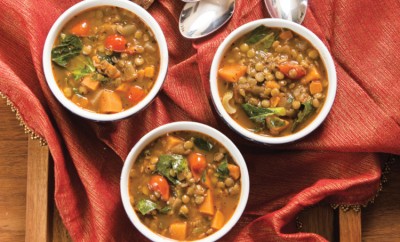Angst-Free New Year’s Resolutions

Lose weight, eat healthier, exercise more. Typical New Year’s resolutions, right? Stop eating gluten, cut out all sugar or reduce carbs are a few more recent ones.
As a dietitian, resolutions like this drive me bananas. The first three are vague, non-specific and not action-oriented. The last three are completely unnecessary – not to mention unrealistic – if your goal is to eat healthier. And all of them are usually broken and completely forgotten by June 1.
So I propose only two resolutions that are sustainable, practical and realistic. Plus, they can provide maximum return on investment to your health and well-being.
1. Food Attitude Adjustment: Stop the negative food/eating talk. Stop blaming, shaming, feeling guilty about choices or overeating, and take control. Give yourself permission to eat and enjoy all our wonderful food choices, and then be responsible for balancing all those choices. Pepper your food talk with positivity rather than negative bashing and bad-mouthing. Candy, cookies, cakes, coffee drinks? Instead of “They’re so bad for me,” say, “Yes! I’d like to enjoy these choices because I know they provide happiness and enjoyment rather than nutrients and health-boosting properties.” Balance your choices with the right amount of the five nutrient-rich food groups and exercise, and you’re free to indulge in these simple pleasures.
2. Science Over Speculation, Sensationalism and Celebrity Opinion: Today, everyone has an opinion or pontificates about how to eat healthy. The more alarmist and sensationalized, the more popular they are. Guilt and angst set in because you think you need to go gluten-free, cut carbs, cut white sugar and so on. But I believe balance, common sense and the ol’ boring variety and moderation will serve you better and stand the test of time. Get evidence-based science on hundreds of food and nutrition topics at two of my favorite reputable sites, bestfoodfacts.org and foodinsight.org.
And here’s the evidence-based science on carbs/sugar/gluten:
- The only people that truly need to eat gluten-free diets are those with serious diseases such as celiac and gluten insensitivity.
- Carbs (found in grains, fruits, vegetables and dairy foods) are absolutely critical to a balanced eating plan that provides all the nutrients to keep you healthy and fuel workouts, activity and exercise.
- Sugar is not evil or toxic. Nor is it the cause of numerous purported diseases. However, sugar is 4 calories per gram. Whether it’s honey, maple syrup, corn syrup, brown sugar or white sugar, they’re all the same calories. And sugar doesn’t provide any additional nutrients, just great taste and enjoyment. Which is why moderating all sugars is recommended. The key word is moderate, not avoid or eliminate.













 My Indiana Home is produced for Indiana Farm Bureau members. Our mission is to connect you with the food you eat, the Indiana farmers who grow it and a rural lifestyle that is uniquely Hoosier.
My Indiana Home is produced for Indiana Farm Bureau members. Our mission is to connect you with the food you eat, the Indiana farmers who grow it and a rural lifestyle that is uniquely Hoosier.
Leave a Comment